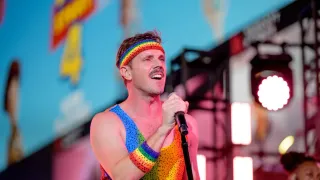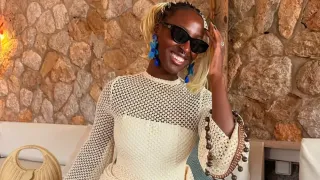
4 hours ago
'Big Brother' UK Housemate George Removed After Unacceptable Behavior
READ TIME: 3 MIN.
Big Brother UK faced growing controversy this week as housemate George Gilbert, a 23-year-old parish councillor and actor from Essex, was removed from the house for repeated breaches of the show's code of conduct . The ejection was triggered by an incident during a game of "Truth or Dare," where George mocked the speech and mannerisms of fellow housemate Sam Ashby, a Zumba instructor and LGBTQ+ rights activist. His actions included limp wrist gestures, which Ashby described as reminiscent of the homophobic abuse he endured during his school years .
Following the incident, George was called to the Diary Room, where he received a verbal warning. He claimed to have apologized to Ashby and stated he would be "walking on eggshells" around him going forward. However, the show's producers determined that the pattern of behavior was unacceptable, leading to his removal from the program .
An ITV spokesperson confirmed the removal, stating: “Following repeated use of unacceptable language and behaviour, George has been removed from the Big Brother House with immediate effect and will no longer participate in the programme” . For compliance with broadcasting standards, the specific comments and footage of the incident will not be aired .
George’s removal comes after a week marked by controversy within the Big Brother house. Earlier incidents included George making remarks about homelessness and sharing political views that reportedly unsettled other contestants . Prior to the removal, he had already received a formal warning for inappropriate conduct during the same game, in which he mocked Ashby’s voice and gestures .
This incident was not isolated—just days before, another housemate, Caroline Monk, was issued a formal warning for misgendering transgender contestant Zelah Glasson. Caroline later apologized and expressed regret for her comments .
The show’s producers, in public statements, have reiterated their commitment to maintaining respect and safety among contestants, noting that “repeated breaches cannot be ignored” .
While the offending comments will not be broadcast, housemates reportedly expressed shock at George’s departure . George, for his part, told housemates that he had not intended to cause harm and would be “careful from now on” . Despite this, the producers concluded that the integrity of the house rules and the well-being of participants took precedence.
The eviction episode will proceed as scheduled, and the show’s producers have confirmed that George’s removal does not impact the timeline of the broadcast .
This incident has reignited discussions about the responsibilities of reality TV producers in fostering safe, respectful environments, particularly for LGBTQ+ housemates and viewers. Sam Ashby, the housemate targeted by George’s behavior, described the mockery as reminiscent of the bullying faced by many LGBTQ+ individuals in their formative years . The public apology and subsequent removal highlight both the harm caused by such conduct and the need for robust, transparent responses from television networks.
Transgender representation and respect for gender identity have also come to the fore in this series, following Caroline Monk’s misgendering of Zelah Glasson and the show’s visible disciplinary measures. Advocacy groups and viewers alike have called for continued vigilance in how reality TV handles issues of identity, consent, and safety .
Mainstream reality TV has long been a contested space for LGBTQ+ representation—simultaneously offering visibility and exposing participants to public scrutiny and potential harm. The swift action taken by Big Brother’s producers has been praised by some as a sign of progress, but also scrutinized by others who question whether preventative measures and support for affected housemates are sufficiently robust .
George Gilbert’s removal from Big Brother UK serves as a high-profile reminder of the ongoing tensions between entertainment, representation, and responsibility. As reality programs continue to attract diverse casts, the expectation grows for producers to enforce clear standards and to support contestants—particularly those from marginalized communities—in meaningful ways.
For now, the show continues, but the conversation about respect, inclusivity, and media ethics in the treatment of LGBTQ+ housemates is far from over.






